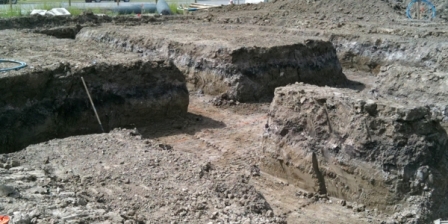
This simple and quick field test will give you a rough idea of bearing capacity of soil.
PROCEDURE
- Excavate a pit of required depth. (preferably equal to the depth of foundation)
- Take a solid ball or square cube of known weight and dimension.
- Drop the ball or square cube several times, from a known height on to the bottom surface of excavated pit.
- Calculate the average depth of impression made several times on the bottom surface of the excavated pit. Let “d” is the average depth of impression.
CALCULATION
Calculate the ultimate resistance of soil ( R ) using the formula given below.
R = (w * h) / d
Where,
R = Ultimate resistance of soil (in kg)
d = Average depth of impression (in cm)
w = Weight of the solid ball or square cube (in kg)
h = Height of fall of solid ball or cube (in cm)
If “A” is the cross-sectional area of the solid steel ball or cube, then resistance of soil per unit area is calculated using following formula.
Resistance of soil per unit area (in kg/cm2) = R / A
Safe bearing capacity (in kg/cm2) = R / (A * F.O.S)
Where,
F.O.S = Factor of safety
NOTES TO REMEMBER
- F.O.S varies from 2 to 3 depending upon the type of structure and site condition.
- In order to get reliable test result, perform this test on different types of soil and then use your judgment to reach at any conclusion.
- Instead of using solid steel ball or square cube, we can also use CBR test plunger, or Cone (used for cone penetration test)
PRESUMPTIVE BEARING CAPACITY
The table given below shows the presumptive bearing capacity values for different types of soils. This table will guide you to reach at any conclusion after conducting the test.
| Type of Soil / Rock | Safe / Allowable Bearing Capacity (kg/cm2) |
| Rock | 32.40 |
| Soft rock | 4.40 |
| Coarse sand | 4.40 |
| Medium sand | 2.45 |
| Fine sand | 4.40 |
| Soft shell / Stiff clay | 1.00 |
| Soft clay | 1.00 |
| Very soft clay | 0.50 |
NOTES TO REMEMBER
- For non-cohesive soils the values should be reduced by 50% if the water table is above or near base of footing.
- These values should be used only for preliminary design. The actual bearing capacity of soil should be calculated as per the standard codes.
Main post from: http://civilblog.org/

Post a Comment